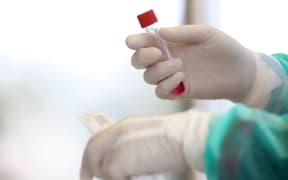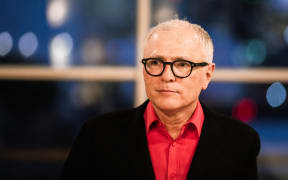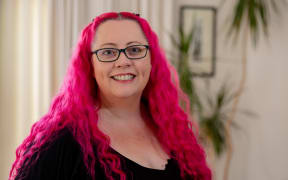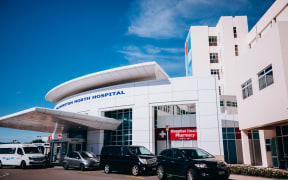Prime Minister Jacinda Ardern has confirmed that the whole of New Zealand will move into the red light Covid-19 setting at midnight tonight.
The nine Covid-19 cases in Nelson yesterday have been confirmed as the Omicron variant, Ardern said.
Another household member has since tested positive.
They are one family and recently attended a wedding and other events in Auckland and there is no clear link to the border.
Ardern said there were well over 100 people at these events.
The family was on the same flight as an Air New Zealand flight attendant who tested positive. All members of the family who were eligible have been double vaccinated, Ardern said.
"That means Omicron is now circulating in Auckland and possibly the Nelson-Marlborough region, if not elsewhere," Ardern said.
Ardern said the focus is on slowing the spread of the Omicron variant and the strategy includes rapid tests, contact tracing and isolating cases and contacts.
New Zealand's system has "significant capacity" to work on stamping out outbreaks due to low case numbers, she said.
"We know we will see far more cases than we have in the two years to date, but the difference to previous outbreaks is we are vaccinated and we are better prepared."
Ardern encouraged New Zealanders to get their boosters saying it will help limit the spread and limit the likelihood of someone getting sick or needing to go to hospital.
She also encouraged parents and caregivers to seek out information about vaccines for their children.
Already, 20 percent of children aged 5-11 have been vaccinated or are booked to receive their vaccination.
Red light setting
Ardern is reminding people the red light settings is not a lockdown.
She said it has restrictions, but business is still open, gathering numbers are reduced and differ depending on whether people are vaccinated or not.
Hospitality is seated and requires a single server.
She said schools remain open, with mask wearing for everyone from year 4 upwards.
Ardern said school ventilation systems will be assessed.
Ardern encouraged households to have a "buddy" to help with food, for example, if someone in your household is unwell from Covid-19.
The government has been preparing for three stages in its response to Omicron, Ardern said.
Phase one includes the period up to 1000 cases a day or less. This is expected to take up to 14 days to arrive, and involves a "stamping-out approach", she said. That includes contact tracing, isolation and testing anyone with symptoms at a community testing station or primary health provider. PCR tests will be used, but rapid antigen tests will also be rolled out to these providers.
In stage one you will need to isolate for 14 days if you are a case or a contact, Ardern said.
She said stage two is a transition stage where the system is adjusted to identifying those at greater risk of Omicron and where there is the greatest risk of severe illness from Omicron.
When asked Ardern said her wedding would not be going ahead under the red setting.
Ardern said New Zealand is not likely to enter stage three for a few weeks and in this stage there will be changes to contact tracing.
It will include the definition of contacts and isolation requirements and more details will be provided on Wednesday, she said.
"It's important to remember Covid is a different foe to what it was at the beginning."
Because of vaccinations, it will be a mild to moderate illness which can be managed at home, she said.
But she said the "team" still needs to do what it can to slow it down, as some people are immuno-compromised and more vulnerable to the virus.
When asked if Cabinet has considered funding N95 masks, Ardern said there will be an assessment on mask advice to consider if there needs to be an update.
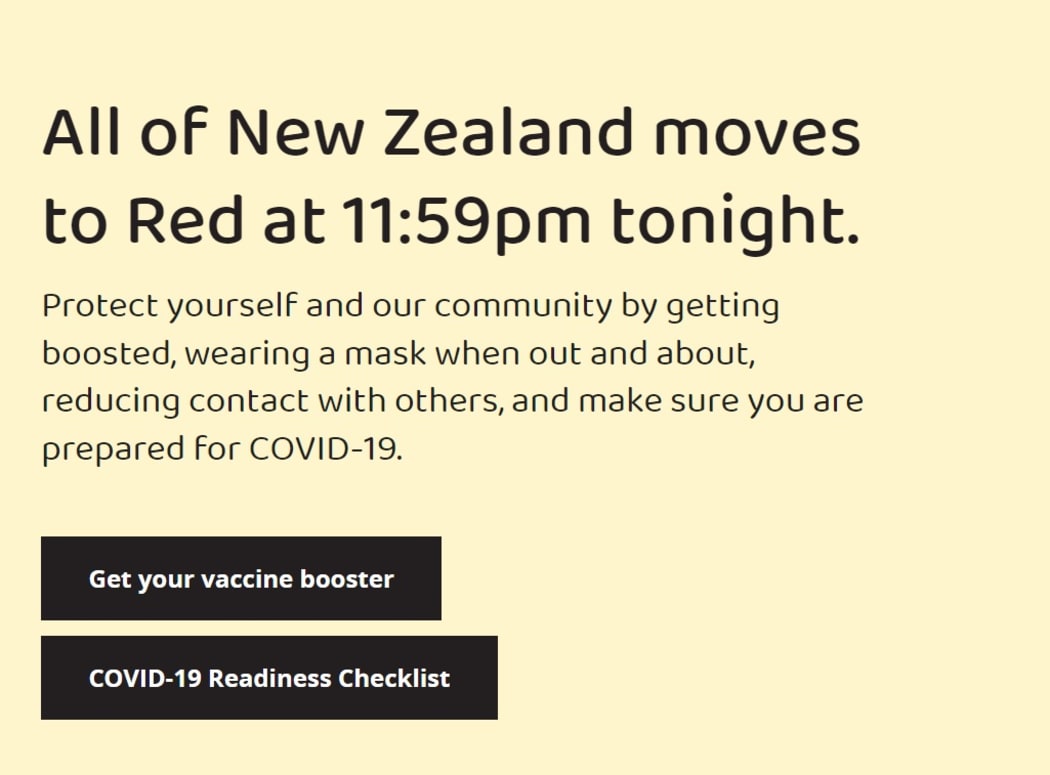
The government's Covid-19 site scooped the prime minister's announcement as the press conference began on Sunday. Photo: Supplied/ Covid-19.govt.nz
Risk of undetected Omicron transmission 'high' - Bloomfield
Director-General of Health Ashley Bloomfield said anyone with symptoms should get tested for Covid-19.
He said the risk of undetected transmission of the Omicron variant in Auckland is considered high, because the Nelson family that's tested positive spent time at a wedding there.
New locations of interest will be listed on the Ministry of Health's website.
There are five Air New Zealand flights that are locations of interest, which include the flights the infected family took, and the flights the flight attendant worked on.
- Flight NZ5083 from Auckland to Nelson at 5.20pm on 16 January
- NZ5080 Nelson to Auckland at 4pm on 19 January
- NZ5077 Auckland to Nelson at 2pm on 19 January
- NZ5049 Auckland to New Plymouth at 7.50pm on 19 January
- NZ5042 New Plymouth to Auckland at 1.50pm on 20 January
Contacts who have been at a location of interest are legally required to isolate and get tested as per Section 70, Bloomfield said.
The risk of undetected transmission is judged as being high, as it is unclear how they became infected and they attended a wedding, he said.
As of 11pm last night, 150 of 192 people on the Air New Zealand flights have been contacted by health officials.
Attendees at the wedding have attended other venues with high numbers of people, including a funeral, an amusement park, the Sky Tower and domestic airports.
It is expected the number of cases and contacts will grow, Bloomfield said.
Bloomfield said people who need medical care can receive it, and urged them to not put it off. Hospitals are at 84 percent occupancy, which is typical at this time of year, and ICU occupancy is under 70 percent.
Wage subsidy scheme for sick/isolating workers - Robertson
Deputy Prime Minister and Minister of Finance Grant Robertson said the economic disruption from the Omicron variant is expected to be more on the supply side of things - as seen overseas.
He said the initial focus is on those unable to be at work because they are infected or are a close contact isolating.
Support for these people includes the Covid-19 Leave Support Scheme, which is paid at the same rate as the Wage Subsidy Scheme.
There will also be a scheme in place for people unable to work from home when waiting on Covid-19 test results.
Robertson said New Zealand can afford the financial support the government is providing - and if anything, cannot afford to not provide it.
He said the country's debt is lower than expected in part because of the wider Covid-19 action taken in New Zealand.
Robertson said the scenario planning shows there could 350,00 people self-isolating at once at the mid-point scenario planning, which would be with 25,000 cases.

